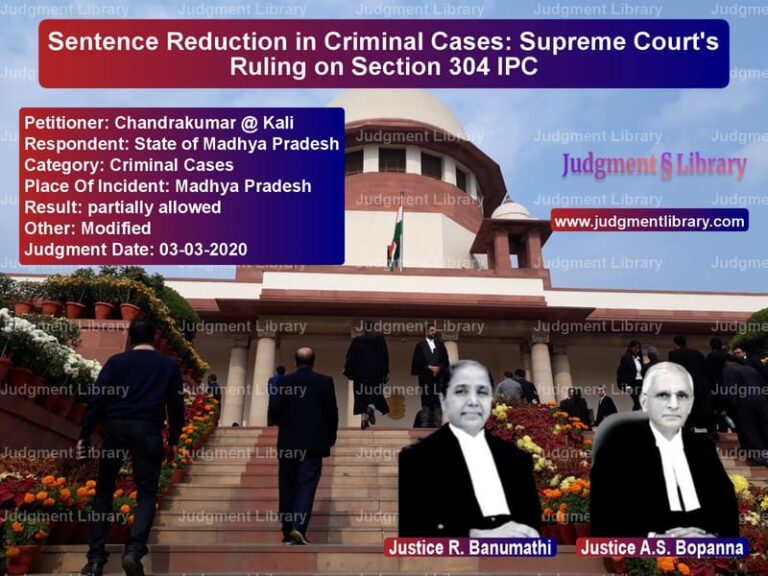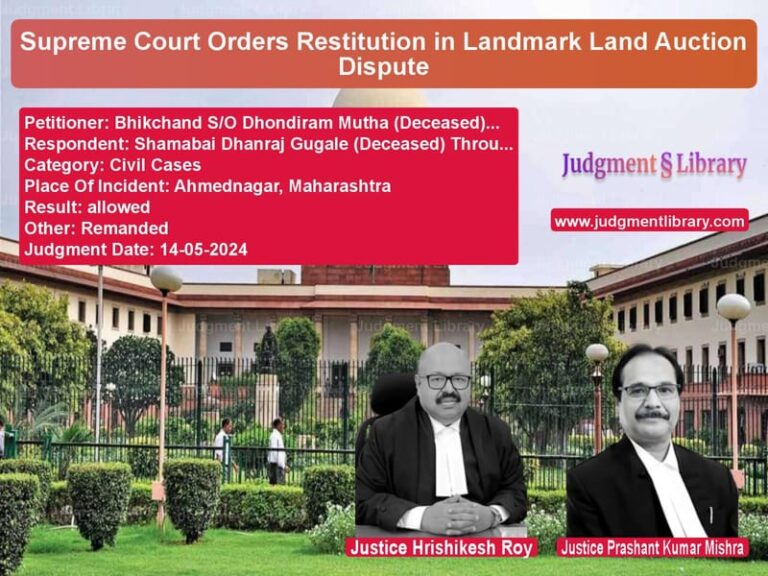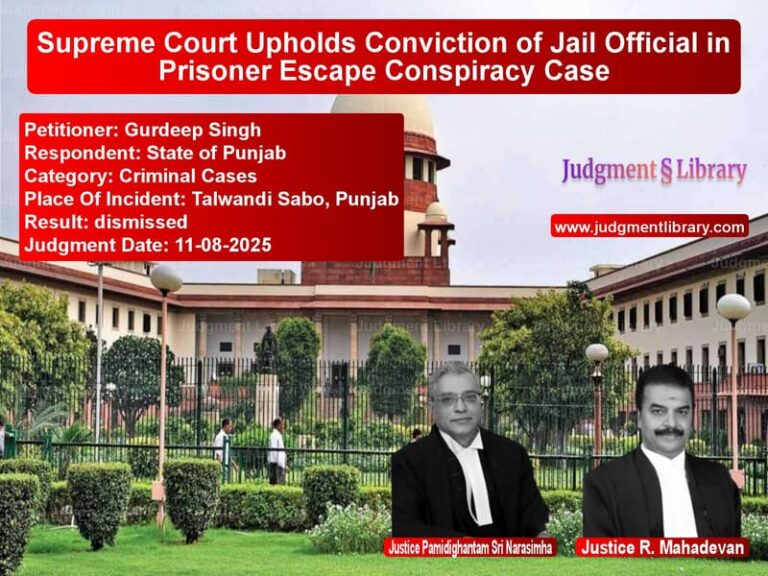Supreme Court Transfers Divorce and Custody Cases to Bengaluru Family Court for Fair Proceedings
The Supreme Court of India, in the case of D. Raja Rajeswari vs. R. Sathish Kumar, ruled on a crucial issue regarding the transfer of multiple legal proceedings related to marriage dissolution and child custody. The case involved disputes between an estranged couple, where the wife sought to transfer the divorce petition filed by her husband in Chennai to the Family Court in Bengaluru, where related cases were already pending. The Supreme Court allowed the transfer to ensure that all matters were adjudicated together in a single forum, ensuring consistency, convenience, and fairness in the legal process.
Background of the Case
The parties, D. Raja Rajeswari (wife) and R. Sathish Kumar (husband), were married but faced serious marital discord. Their disputes led to multiple legal proceedings, including:
- A divorce petition filed by the husband before the Family Court in Chennai.
- A petition for restitution of conjugal rights filed by the wife before the Family Court in Bengaluru.
- A custody petition filed by the husband seeking permanent custody of their minor child before the Family Court in Bengaluru.
Given the existence of related proceedings in Bengaluru, the wife filed a transfer petition before the Supreme Court, arguing that all matters should be heard by the same court to avoid conflicting decisions and unnecessary hardships.
Legal Issues Considered
The Supreme Court examined the following key issues:
- Whether the divorce case should be transferred to Bengaluru for judicial consistency.
- Whether multiple proceedings in different courts could lead to conflicting judgments.
- Whether the transfer was necessary to avoid inconvenience to the parties, especially the wife, who was the primary caregiver of the child.
Arguments by the Petitioner (Wife)
The petitioner, D. Raja Rajeswari, submitted the following arguments in support of the transfer:
- She was residing in Bengaluru with the minor child, and traveling to Chennai for litigation would cause significant inconvenience.
- The husband himself had first chosen Bengaluru as the venue for legal proceedings when he filed for custody there.
- Conducting litigation in different cities would lead to conflicting judicial decisions regarding divorce, custody, and maintenance.
- The respondent was financially stable and had the means to travel to Bengaluru for hearings.
Arguments by the Respondent (Husband)
The respondent, R. Sathish Kumar, opposed the transfer on the following grounds:
- He was residing in Chennai and had the right to file the divorce case there.
- The wife had separately challenged the divorce proceedings, and transferring them now would cause delays in adjudication.
- He was willing to bear some travel costs for his wife if necessary but preferred proceedings in Chennai.
Supreme Court’s Key Observations
1. Importance of a Single Forum for Matrimonial Disputes
The Supreme Court emphasized that in family law cases involving multiple issues such as divorce, child custody, and maintenance, it is ideal to have all proceedings consolidated before the same court. The Court observed:
Read also: https://judgmentlibrary.com/supreme-court-grants-divorce-due-to-irretrievable-breakdown-of-marriage/
“In matrimonial disputes where child custody and financial issues are also involved, it is expedient that all cases be heard in a single forum to ensure judicial consistency and avoid hardship to the litigants.”
2. Avoiding Conflicting Decisions
The Court noted that if the divorce case remained in Chennai while the custody and conjugal rights petitions were heard in Bengaluru, there was a high possibility of contradictory orders:
“It is in the best interest of justice that all matters are decided by the same Family Court to prevent conflicting decisions that may arise due to separate adjudications.”
3. Convenience of the Wife
The Supreme Court acknowledged that the wife was the primary caregiver of the child and resided in Bengaluru. Expecting her to travel frequently to Chennai would cause undue hardship:
“While the respondent has the means to travel, the petitioner is the primary caregiver of the minor child, making it impractical for her to attend proceedings in Chennai regularly.”
4. The Husband’s Own Choice of Bengaluru for Child Custody Proceedings
The Court pointed out that the husband himself had earlier filed a custody petition in Bengaluru, which indicated that he was comfortable litigating there:
“The respondent first initiated legal proceedings in Bengaluru, which establishes that it is a convenient forum for him as well.”
Final Judgment
Based on these considerations, the Supreme Court ruled:
- The divorce case filed by the respondent in Chennai was transferred to the Family Court in Bengaluru.
- The Principal Judge of the Family Court in Bengaluru was directed to ensure that all cases (custody, divorce, and restitution of conjugal rights) were heard together.
- The Family Court in Bengaluru was instructed to expedite proceedings to ensure timely adjudication.
Implications of the Judgment
1. Efficiency in Matrimonial Disputes
The ruling ensures that cases involving the same parties are heard together, leading to judicial efficiency and avoiding unnecessary delays.
2. Preventing Conflicting Orders
By consolidating related matters, the judgment ensures that one court has full control over all disputes between the parties, reducing the risk of contradictory decisions.
3. Prioritizing the Interests of the Primary Caregiver
The Court’s ruling acknowledges that in family law matters, the convenience of the primary caregiver, especially when children are involved, must be a major consideration.
4. Encouraging Fair Litigation
The judgment prevents a party from strategically filing cases in different jurisdictions to inconvenience the other party, ensuring a level playing field.
Conclusion
The Supreme Court’s decision in D. Raja Rajeswari vs. R. Sathish Kumar reinforces the principle that matrimonial disputes involving multiple issues should be heard in a single court for consistency and fairness. The ruling prioritizes judicial efficiency, litigants’ convenience, and the best interests of children, setting an important precedent for future transfer petitions in family law cases.
Read also: https://judgmentlibrary.com/supreme-court-allows-delay-in-divorce-appeal-under-special-marriage-act/
Petitioner Name: D. Raja Rajeswari.Respondent Name: R. Sathish Kumar.Judgment By: Justice Abhay S. Oka.Place Of Incident: Bengaluru, Karnataka.Judgment Date: 27-09-2021.
Don’t miss out on the full details! Download the complete judgment in PDF format below and gain valuable insights instantly!
Download Judgment: d.-raja-rajeswari-vs-r.-sathish-kumar-supreme-court-of-india-judgment-dated-27-09-2021.pdf
Directly Download Judgment: Directly download this Judgment
See all petitions in Child Custody
See all petitions in Mutual Consent Divorce
See all petitions in Divorce by Desertion
See all petitions in Alimony and Maintenance
See all petitions in Judgment by Abhay S. Oka
See all petitions in allowed
See all petitions in supreme court of India judgments September 2021
See all petitions in 2021 judgments
See all posts in Divorce Cases Category
See all allowed petitions in Divorce Cases Category
See all Dismissed petitions in Divorce Cases Category
See all partially allowed petitions in Divorce Cases Category







